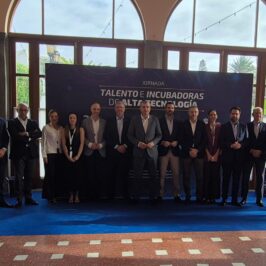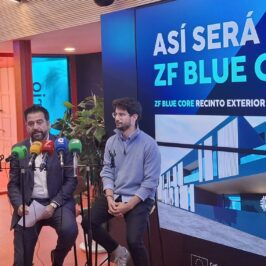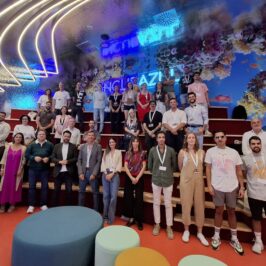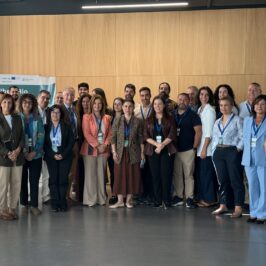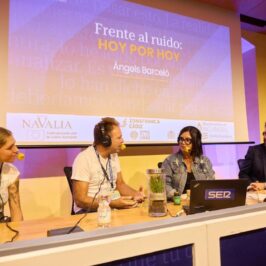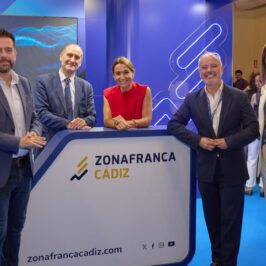The initiative was born today under the image of Oceanicadiz and sponsored by the City Council, the UCA, the Free Trade Zone, the Port Authority and the CSIC.
During the preparation, interested institutions that are part of the blue economy ecosystem may be added.
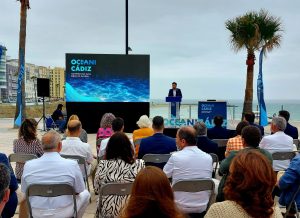
Cádiz is going to compete with a formal candidacy to host a collaborating center for the Unesco Decade of the Oceans. The City Council, the UCA, the Port Authority of the Bay of Cádiz, the CSIC and the Free Trade Zone have staged their alliance under the name and image of Oceanicadiz to show the robustness of the blue economy ecosystem and all the strategies that They make this city a hub of innovation and research that deserves to host this institution.
The Ocean Decade is a UNESCO initiative to ensure that ocean sciences support countries in achieving SDG 14 “Marine Life”, bringing together all stakeholders (scientific community, politicians, businesses and civil society) to plan a decade dedicated to ocean science and technology. In the case of the collaborating centers, they are those that coordinate the actions of this initiative in the area and have, among others, the tasks of making specific contributions to the reports, disseminating the work among potential partners, being part of an annual forum , create and participate in communication tasks and identify partners and collaborators.
Oceanicadiz is the brand of this candidacy in which the five institutions have unified their strategies in a solid proposal that brings together all facets of the blue economy: from the generation of knowledge and research, to the application and enhancement of technology. idea, to support entrepreneurship and innovation thanks to the contributions of the Institute of Marine Sciences of Andalusia (ICMAN-CSIC); to the UCA, the only Spanish university institution where it is possible to study all official degree studies in this field and is part of the Campus of International Excellence of the Sea (CEI-Mar), as well as the European Alliance of the Seas (SEA-EU) or INMAR (Marine Research Institute). In the case of the Cádiz Free Trade Zone, it provides all the experience in promoting innovation and is committed to entrepreneurship in the blue economy that Incubazul represents today, while the APBC is immersed in a process of renewal and strategic commitment to sustainability with pioneering initiatives such as the electrification of docks using the OPS (Onshore Power Supply) system for cruise ships.
The unification and synergy of this entire ecosystem that is already a reality in Cádiz makes Oceanicadiz a successful candidate to host one of these headquarters. The proposal can continue to be enriched and complemented with the contributions and support of other institutions that are part of the ecosystem and want to support this initiative.
The declaration signed today by the five institutions represents the starting point for the candidacy, which must subsequently be materialized in a declaration of interest that includes all the contributions made from now on and specifies the form of collaboration between the parties. . This declaration will be sent to UNESCO so that they are aware of the development of the candidacy until the formal concurrence proceeds, which will require greater precision.
This was expressed during the presentation, where the director of the ICMAN-CSIC of Cádiz, Antonio Tovar, who valued the “unprecedented opportunity to promote marine sciences, the blue economy and sustainable management, but above all it will give promotion of scientific research; It will attract local, national and international collaboration and will provide visibility and recognition” among other tangible benefits of the proposal.
“It is an opportunity that we are passionate about and we have to transmit it,” commented the delegate of the Free Trade Zone, Fran González, who has conveyed the conviction that “Cádiz is already a hub in the blue economy: we just have to connect the dots and consolidate the ecosystem and this is the opportunity to show our reality, our strength and everything we have to say and do in the blue economy, which is nothing more than sustainability and the future.”
The rector of the UCA has highlighted the strength of the unity of the institutions promoting the project since “we have shown that with effort, intelligence and determination it is possible to lead international projects of excellence linked to marine-maritime studies, innovation and transfer of knowledge in the field of the Blue Economy”, as is the case of the Campus of International Excellence of the Sea (CEI·Mar) of the European University of the Seas (SEA-EU). At the same time, Casimiro Mantell pointed out that “today we signed the initial commitment. A necessary first step. A first document that we are going to send to UNESCO as a sign of interest and commitment to assume this leadership together to build together and from the sea the future of this land... and of this city, surrounded by the sea and multiple opportunities that come from the Blue Economy”
The mayor of Cádiz, Bruno García, has highlighted that one of the strengths of this initiative is that “it is born from the consensus of different administrations.” In this sense, he added that the University of Cádiz, the Free Trade Zone, the Port Authority and the City Council “go hand in hand under the same objective, which is to put ourselves at the forefront of sustainability and the blue economy.” Likewise, he has said that the presentation of the candidacy is not the culmination of a path but "the beginning of a trajectory in which many other administrations and people related to the blue economy have to join."
For the president of the Port Authority, Teófila Martínez, “the environmental dimension of the Port of the Bay of Cádiz arises from the intention of finding the best possible fit in the territory in which we are located and materializes as a priority strategic commitment to face the future with guarantees.”
“With this basic approach, -explains the president-, we plan, design and execute the investments of the Port of the Bay of Cádiz, from the conviction that, not just the future, but the present, either it is sustainable, or it is green. and blue, or it is not.” In this same sense, Martínez has emphasized the proactive role that administrations must play, so initiatives such as Oceanicadiz are a way to also create a blue culture and ensure that the commitment transcends from the individual to the global.




